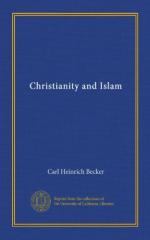The relationship of the Qoran to Christianity has been already noted: it was a book which preached rather than taught and enounced isolated laws but no connected system. Islam was a clear and simple war-cry betokening merely a recognition of Arab supremacy, of the unity of God and of Muhammed’s prophetic mission. But in a few centuries Islam became a complex religious structure, a confusion of Greek philosophy and Roman law, accurately regulating every department of human life from the deepest problems of morality to the daily use of the toothpick, and the fashions of dress and hair. This change from the simplicity of the founder’s religious teaching to a system of practical morality often wholly divergent from primitive doctrine, is a transformation which all the great religions of the world have undergone. Religious founders have succeeded in rousing the sense of true religion in the human heart. Religious systems result from the interaction of this impulse with pre-existing capacities for civilisation. The highest attainments of human life are dependent upon circumstances of time and place, and environment often exerts a more powerful influence than creative power. The teaching of Jesus was almost overpowered by the Graeco-Oriental culture of later Hellenism. Dissensions persist even now because millions of people are unable to distinguish pure religion from the forms of expression belonging to an extinct civilisation. Islam went through a similar course of development and assumed the spiritual panoply which was ready to hand. Here, as elsewhere, this defence was a necessity during the period of struggle, but became a crushing burden during the peace which followed victory, for the reason that it was regarded as inseparable from the wearer of it. From this point of view the analogy with Christianity will appear extremely striking, but it is something more than an analogy: the Oriental Hellenism of antiquity was to Christianity that which the Christian Oriental Hellenism of a few centuries later was to Islam.
We must now attempt to realise the nature of this event so important in the history of the world. A nomadic people, recently united, not devoid of culture, but with a very limited range of ideas, suddenly gains supremacy over a wide and populous district with an ancient civilisation. These nomads are as yet hardly conscious of their political unity and the individualism of the several tribes composing it is still a disruptive force: yet they can secure domination over countries such as Egypt and Babylonia, with complex constitutional systems, where climatic conditions, the nature of the soil and centuries of work have combined to develop an intricate administrative system, which newcomers could not be expected to understand, much less to recreate or to remodel. Yet the theory has long been held that the Arabs entirely reorganised the constitutions of these countries. Excessive importance has been attached to the statements




